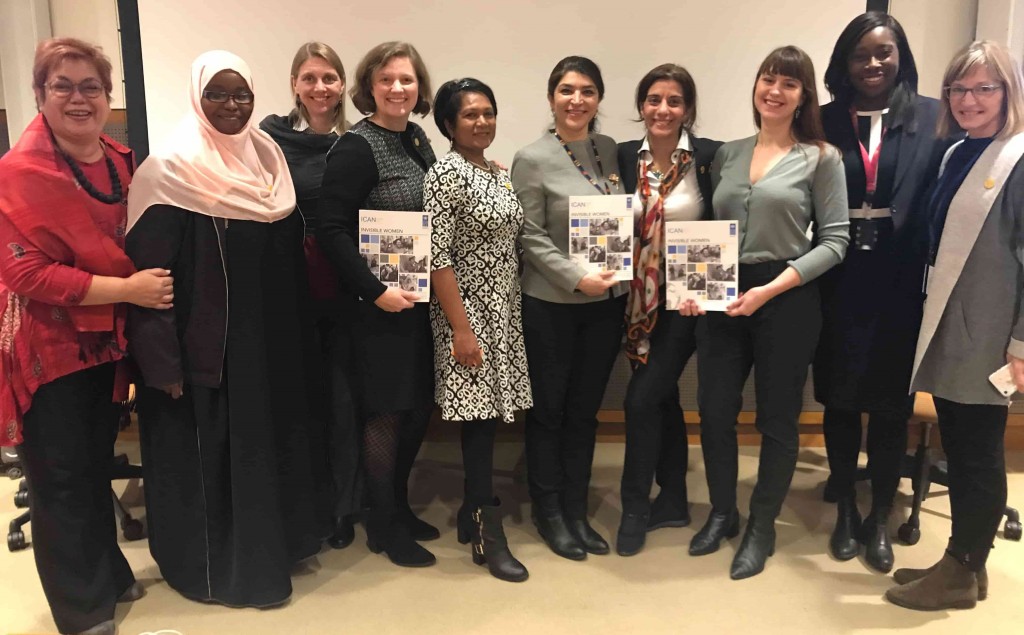
On Thursday, February 28th, 2019, the governments of Norway and Jordan convened a technical meeting at the United Nations on Advancing a Holistic and Gendered Approach to Return, Rehabilitation, and Reintegration from Violent Extremism. ICAN’s Founder and Executive Director, Sanam Naraghi Anderlini moderated a conversation among members of the Women’s Alliance for Security Leadership (WASL): Sabrina Mowlah-Baksh from Trinidad and Tobago, Mira Kusumarini from Indonesia, and Halima Mohamed from Kenya, along with UNDP’s Nika Saeedi.
This event marked the publication of the new report Invisible Women: Gendered Dimensions of Return, Rehabilitation, and Reintegration, jointly produced by the United Nations Development Programme (UNDP) and the International Civil Society Action Network (ICAN). Ms. Naraghi Anderlini highlighted the relevance of gender to violent extremist movements whose ideology is based on the subservience of women. Such groups co-opt women, understanding the importance of their contributions, and coerce women. It is precisely because women are targeted that they become first responders who provide a vision of society which is locally rooted, authentic yet opposed to extremist movements. The report, divided into sector specific analysis, case studies of good practice, and practical guidance, captures the complexity of women’s experiences and what they mean for return and reintegration.
 Mira Kusumarini, Co-founder and Executive Director of the Civil Society Against Violent Extremism (C-SAVE), seized the opportunity to work with women and children—who are 75% of returnees in Indonesia—local communities and different ministries to develop standard operating procedures for rehabilitation and reintegration processes. “It’s important to have a balanced perspective” and work with communities who often discriminate against those returning from violent extremist groups.
Mira Kusumarini, Co-founder and Executive Director of the Civil Society Against Violent Extremism (C-SAVE), seized the opportunity to work with women and children—who are 75% of returnees in Indonesia—local communities and different ministries to develop standard operating procedures for rehabilitation and reintegration processes. “It’s important to have a balanced perspective” and work with communities who often discriminate against those returning from violent extremist groups.
Sabrina Mowlah-Baksh, a women’s rights activist in Trinidad and Tobago, discussed the strong correlation between gang activity and violent extremism. She advocates for a strong gender analysis because violent extremism affects men, women, boys, and girls differently and “women know who the recruiters are” but are fearful to discuss their concerns.
Ms. Kusumarini and Ms. Mowlah-Baksh both expressed the challenge of their work as connectors between communities. “We don’t want to be identified with anyone because one side thinks you’re sympathetic to the other,” said Ms. Mowlah-Baksh, who also described how the government of Trinidad & Tobago is more focused now on aiding refugees from Venezuela as opposed to returnees. She continues to build trust with families on a local level but acknowledged that the roles of the state and community are crucial. Ms. Kusumarini described the risk of recruitment and of being caught by the police for those providing support to radical groups. She advocated for peacebuilders like herself to be protected in this work with strong policy frameworks and security and safety protocol. She also recommends that governments develop a robust policy framework to ensure collaboration among ministries and civil society.
Halima Mohamed, Co-Founder and Executive Director of Coast Education Centre (COEC), who attended the meeting, offers psychosocial and livelihood support to women who have lost their husbands and sons to Al Shabaab. She concurred that while women sharing their experiences helps to prevent recruitment, the work is risky for peacebuilders who must protect themselves from their governments and extremist groups.
Nika Saeedi from UNDP also spoke on the panel, advocating for the accountability of member states and all of the United Nations to fully fund, monitor, and implement the recommendations of the report.
Ms. Mowlah-Baksh concluded that “coming from the civil society perspective, we are only seen as informers; people only want to consult with us. We do national, regional, and international work but our work is invisible.” Therefore, hearing the voices of women and adopting an intersectional approach is critical. Recognizing the civil society work of active citizens and peacebuilders enables them to not only prevent violent extremism but promote an alternative, peaceful vision.
